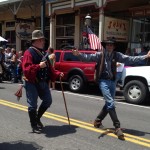Do I Need to Draw You a Picture? The Zimmerman Trial and CGI Evidence
The Zimmerman trial nicely illustrates how messy trials can be. Witnesses contradict one another on most critical issues. For example, a bevy of witnesses have split over whether it was the victim Trayvon Martin or the defendant George Zimmerman screaming for help on the 911 recording. Moreover, the split among witnesses is, predictably, along party lines: friends and relatives of each claim the voice as their own. To make things messier, some of these witnesses seem to have contradicted themselves, asserting earlier that they couldn’t recognize the voice despite their trial testimony that now positively identifies it. Adding to the confusion, some witnesses deny making the earlier inconsistent statements.
So, what’s the jury to make of this morass? The defense solution is to draw a picture – literally. Yesterday the parties sparred over the defense’s attempts to introduce a computer-animated recreation of the fatal struggle between Zimmerman and Martin. Computer-graphic imaging (CGI) technology is being used more and more to recreate events in a myriad of cases. A week of conflicting testimony may be reduced to a 60-second cartoon.
There are two problems here. First, the accuracy (authentication) of a CGI recreation depends on its fidelity to the historical record: does it accurately reflect what occurred? Hard to say in this case. Martin is dead. Zimmerman has not testified. The CGI recreation rests on the creators’ reconstruction of events based on conflicting pretrial statements, including Zimmerman’s, some of which have been contradicted by trial testimony, itself no model of clarity.
Put differently, the CGI recreation is the animators’ version of the shooting, resting heavily on the defense version of events. It is tantamount to Zimmerman’s story of what occurred with one crucial difference: Zimmerman does not have to take the stand and face cross-examination under oath about any of it. My own view is that it should be excluded unless Zimmerman takes the stand and testifies that it “fairly and accurately” depicts what happened.


